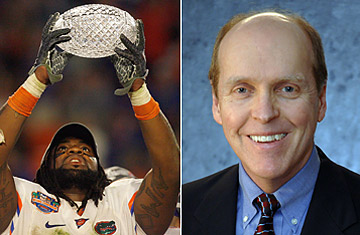
Brandon Spikes of the Florida Gators holds up the winning trophy after the FedEx BCS National Championship Game; Bill Hancock
There are few people in sports as beloved as Bill Hancock, who was just appointed the first permanent executive director of the Bowl Championship Series (BCS), the highly controversial, deeply unpopular system that determines the national champion of college football. A long-time college sports administrator and former director of the Final Four, Hancock is the rare sports exec who has amassed few, if any, enemies, and actually enjoys helping people in a pinch. "I know at least 99 people who would list Bill as their absolute best friend," says Bob Condron, a veteran USOC executive who has known Hancock for some 40 years. "I'm just happy to be one of them."
I first met Hancock at the 2004 Summer Olympics in Athens. He was assisting the U.S. Olympic Committee media officers. Like so many other journalists, I leaned on Hancock to secure scarce credentials to the big events. At the Beijing Games, I called him one afternoon with some inane logistical question. He answered my call while sightseeing, taking a well-deserved break from the Olympic grind. I offered to leave him alone, but he wouldn't hear of it. Hancock stopped in his tracks and talked me through the issue.
Hancock is such a universally liked guy that when his new job as head of the BCS was announced on Nov. 17, there was a collective cringe in the college sports world. Bill, say it ain't so! We're coming up on that time of the year when the entire country complains about the stupidity of the BCS, which relies on votes from coaches, sportswriters, and indecipherable computer formulas to decide which two teams get to play each other in the national title game. This year, the picture is particularly muddled, as five schools have the potential to finish the season undefeated (Boise State, Cincinnati, Texas, Texas Christian University and either Florida or Alabama, who will likely square off in the Dec. 5 SEC title game). Why can't they determine who's best by — get this — playing each other on the football field?
At this point, nearly everyone is fed up with the BCS, and is clamoring for a college football playoff tournament, along the lines of the insanely popular March Madness event for college hoops. Coaches, players, fans, the media and politicians — including President Obama — have barked for change. And in his new position, Hancock becomes the public face of the current despised setup, perhaps the last man standing against the playoff. Si.com's Andy Staples wrote that Hancock's job "is only slightly easier" than being a "Ringling Brothers elephant cage cleaner" or "Jon Gosselin's publicist." On his Twitter page, Yahoo! Sports columnist Dan Wetzel, who also admires Hancock personally and is the most vocal, and reasoned, media critic of the BCS, wrote, "I hope Bill Hancock is being paid big to get humbled." (Heads up, Bill: Wetzel is also authoring an investigative book on the BCS).
Besides the obvious fact that he's drawing what is presumably a handsome salary, why would such a nice guy want one of the worst jobs in sports? Hancock realizes he's about to take his hits, but laughs off the idea that his new position is a burden. He's a believer. "I love college football," says Hancock, who returned my phone call after attending a Thanksgiving potluck at his grandson's grade school. "I believe in the BCS because a playoff would be equally contentious. For example, if you had a four-team playoff today, which two undefeated teams would you leave out? What eight teams would you put in a playoff? Which one-loss or two-loss teams would you leave out?"
By championing the BCS system, created a decade ago by a cartel of college presidents and commissioners from the country's elite athletic institutions, Hancock is essentially defending the OPEC of college football. "I think what's been missing in this is some reasonable dialogue," he says. "The other side has had the field to themselves. And it's time for us to be on the field talking with people." To that end, Hancock and the BCS have hired high-level help. President George W. Bush’s former press secretary, Ari Fleischer, has joined the effort to spruce up the image of the BCS.
You can certainly pick apart Hancock's arguments for keeping the BCS. For example, he says that since playoff games would most likely take place through December, the event would cut into the players' study time during finals. But it's not like players are burying themselves in the library under the current set-up: they are still practicing for bowl games, which take place later in the month and after the New Year, through much of December. Hancock points out that in the current bowl set-up, 68 schools and their fans get the chance to enjoy post-season play (and revenue). But you can still hold the Chick-Fil-A and Meineke Car Care Bowls under a playoff format. These games are meaningless now. They can still be meaningless while the elite teams duke it out in a tournament.
The arguments against the BCS will never subside, and it will be hard for Hancock to convince doubters that he's not just a flack for the schools and bowl executives enriching themselves on the current system. However, if there's anyone who can at least quiet some BCS critics with his passion, dignity and down-to-earth charm, it's Hancock. He should start at the top, and propose Beer Summit II with the BCS' most high-profile critic. "I'm an Obama guy and I'd welcome the chance to visit with him," Hancock says. If Hancock calls, Mr. President, pick up. You might never love the BCS. But you'd certainly enjoy a beer with Bill. And maybe you can do many of his admirers a favor, and convince him to get out of this BCS business.
